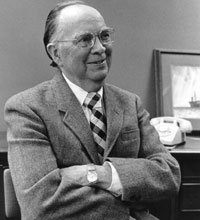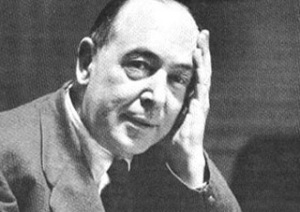 Clyde Kilby was a central figure in ensuring that the works of C. S. Lewis were never forgotten. Kilby is largely responsible for assembling the largest collection of Lewis papers and books by and about him in the U.S. He was director of the Marion E. Wade Center at Wheaton College for many years.
Clyde Kilby was a central figure in ensuring that the works of C. S. Lewis were never forgotten. Kilby is largely responsible for assembling the largest collection of Lewis papers and books by and about him in the U.S. He was director of the Marion E. Wade Center at Wheaton College for many years.
Kilby corresponded with Lewis and was able to sit down and talk with him face-to-face in July 1953. When he returned to America, he wrote an article that gave details of that visit. What I’m discovering as I study Lewis is that all those who met him for the first time came away with common stories about that first meeting, and their recollections are very similar. Let me offer a few sample paragraphs from the chapter I’m writing in my book about Lewis’s impact on Americans. Here is what happened at that first meeting:
Upon knocking, Kilby was greeted warmly by the man who had meant so much to him in writing. First impressions? “He has a pleasant, almost jolly face, full though not fat, with a double chin. He has a high forehead and thinning hair. Actually, he is a much better looking man than the published picture of him.” Kilby also liked Lewis’s sense of humor, of a type understood best by a fellow academic: “He spoke of the making of a bibliography as just plain labor and laughed about the idea of the scholar’s life as a sedentary one, saying that the physical labor of pulling big folios from the shelves of the Bodleian was all the exercise he needed.”
It was the sharing of minds, though, that stood out to Kilby as he looked back on this meeting. . . . Given Lewis’s penchant for writing novels, they debated the exact nature of that specific species of literature. When Kilby quoted someone who had said a novel is no better than a well-told lie, Lewis objected: “As I expected, he disagreed completely with this claim, saying that one is far more likely to find the truth in a novel than in a newspaper. In fact, he said he had quit reading newspapers because they were so untruthful.”
 Kilby then discovered something about the character of Lewis that stayed with him:
Kilby then discovered something about the character of Lewis that stayed with him:
The only awkward moment was when Kilby asked him to autograph one of Lewis’s books he had brought with him. Although Lewis agreed to the request, he commented that he saw no sense in doing so. That led Kilby to conclude something about his character: “Both from reading his books and talking with him, I get the impression that he is far more fearful than most of us of the subtle sin of pride and tries in every way to escape it: thus his reticence to give an autograph.” Perhaps that is what should be expected from one who wrote a book detailing how Satan traps Christians. The Screwtape Letters may have been one of the hardest books Lewis ever wrote, but the message of it seemed to remain with him to the end.
The true test of a real man or woman of God is their humility. There are countless testimonies that, in spite of his fame and great learning, C. S. Lewis retained a heart of even greater humility. That’s one excellent reason why he is worthy of study.
